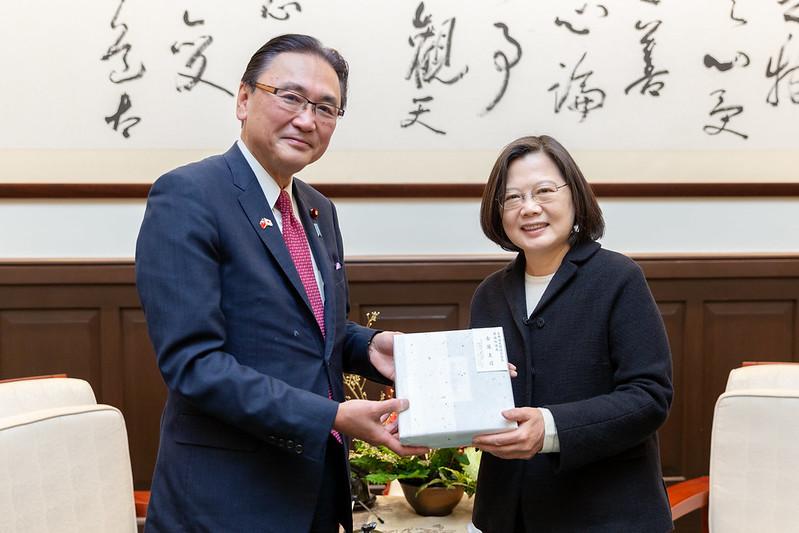Lawmakers from Japan, Canada, Germany and the UK are planning trips to Taiwan in the next few months to show support amid heightened Chinese intimidation following US House of Representatives Speaker Nancy Pelosi’s visit to Taipei earlier this month.
Next to visit from Monday to Wednesday next week is a delegation from Japan’s parliament, Kyodo News reported on Tuesday.
The group is to be led by Japanese Representative Keiji Furuya, chair of the Japan-ROC Diet Members’ Consultative Council and a member of the ruling Liberal Democratic Party, Kyodo News reported, quoting multiple sources.

Photo: Reuters
They are expected to meet with President Tsai Ing-wen (蔡英文) and defense officials to discuss improving defense systems in cooperation with the US, as well as Chinese military drills staged after Pelosi’s visit, it reported.
They are also expected to discuss sending a council delegation to attend Double Ten National Day celebrations on Oct. 10 and holding trilateral strategic dialogue with US lawmakers, it said.
Furuya previoulsy visited Taiwan in September 2020 to attend the funeral of former president Lee Teng-hui (李登輝).

Photo courtesy of Office of the President.
The Ministry of Foreign Affairs on Tuesday welcomed the announced visit by the council, which sent a delegation annually until the COVID-19 pandemic began in 2020.
Emphasizing the trip as a return to normalcy as border controls are eased, ministry spokeswoman Joanne Ou (歐江安) told the Central News Agency that arrangements are still being made and details would be made public when ready.
Canadian lawmakers are planning a trip to Taiwan in October for what the delegation’s leader called a “necessary” visit.
The group of eight from the Canadian House of Commons Standing Committee on International Trade is to be led by the group’s chair, Judy Sgro of the Liberal Party, Canadian Broadcasting Corp (CBC) reported on Tuesday.
“The trade committee is very anxious to go and to visit Taiwan and see what opportunities there are for deeper trade relations between our two countries,” CBC quoted Sgro as saying.
Sgro, who chairs the Canada-Taiwan Parliamentary Friendship Group, said that planning for the trip began last spring, but is still contingent on COVID-19 protocols.
“We need to protect other countries that have fought for their freedom and for their democracy,” she said. “So, yes, you know, I’m trying to be diplomatic in my comments, but clearly I’m proud that Canada is standing up to China as well, and I think that pushback is very important.”
The group, which had 89 members from both parliamentary chambers as of last year, previously sent a delegation to Taiwan in 2014.
Two separate delegations from Germany’s Bundestag are expected in October.
Six lawmakers of the Germany-Taiwan Parliamentary Friendship Group are planning a visit during the first week of October, German lawmaker Holger Becker told visiting Taiwanese officials on Monday last week.
At the end of October, the Bundestag’s Committee on Human Rights is to send a delegation of eight lawmakers from six political parties to Taiwan as part of a larger Asia tour, German news agency DPA reported.
The committee had reportedly planned a visit in 2020 that was canceled due to the pandemic.
Earlier this month, the Guardian reported that the UK House of Commons Foreign Affairs Committee is to send a delegation in November or early December.
If he is still chair of the committee after elections next month, British Member of Parliament Tom Tugendhat is expected to lead the trip, which was postponed from early this year after a member tested positive for COVID-19, it said.
Additional reporting by Lu Yi-hsuan

CHAOS: Iranians took to the streets playing celebratory music after reports of Khamenei’s death on Saturday, while mourners also gathered in Tehran yesterday Iranian Supreme Leader Ayatollah Ali Khamenei was killed in a major attack on Iran launched by Israel and the US, throwing the future of the Islamic republic into doubt and raising the risk of regional instability. Iranian state television and the state-run IRNA news agency announced the 86-year-old’s death early yesterday. US President Donald Trump said it gave Iranians their “greatest chance” to “take back” their country. The announcements came after a joint US and Israeli aerial bombardment that targeted Iranian military and governmental sites. Trump said the “heavy and pinpoint bombing” would continue through the week or as long

TRUST: The KMT said it respected the US’ timing and considerations, and hoped it would continue to honor its commitments to helping Taiwan bolster its defenses and deterrence US President Donald Trump is delaying a multibillion-dollar arms sale to Taiwan to ensure his visit to Beijing is successful, a New York Times report said. The weapons sales package has stalled in the US Department of State, the report said, citing US officials it did not identify. The White House has told agencies not to push forward ahead of Trump’s meeting with Chinese President Xi Jinping (習近平), it said. The two last month held a phone call to discuss trade and geopolitical flashpoints ahead of the summit. Xi raised the Taiwan issue and urged the US to handle arms sales to

State-run CPC Corp, Taiwan (CPC, 台灣中油) yesterday said that it had confirmed on Saturday night with its liquefied natural gas (LNG) and crude oil suppliers that shipments are proceeding as scheduled and that domestic supplies remain unaffected. The CPC yesterday announced the gasoline and diesel prices will rise by NT$0.2 and NT$0.4 per liter, respectively, starting Monday, citing Middle East tensions and blizzards in the eastern United States. CPC also iterated it has been reducing the proportion of crude oil imports from the Middle East and diversifying its supply sources in the past few years in response to geopolitical risks, expanding

Pro-democracy media tycoon Jimmy Lai’s (黎智英) fraud conviction and prison sentence were yesterday overturned by a Hong Kong court, in a surprise legal decision that comes soon after Lai was jailed for 20 years on a separate national security charge. Judges Jeremy Poon (潘兆初), Anthea Pang (彭寶琴) and Derek Pang (彭偉昌) said in the judgement that they allowed the appeal from Lai, and another defendant in the case, to proceed, as a lower court judge had “erred.” “The Court of Appeal gave them leave to appeal against their conviction, allowed their appeals, quashed the convictions and set aside the sentences,” the judges